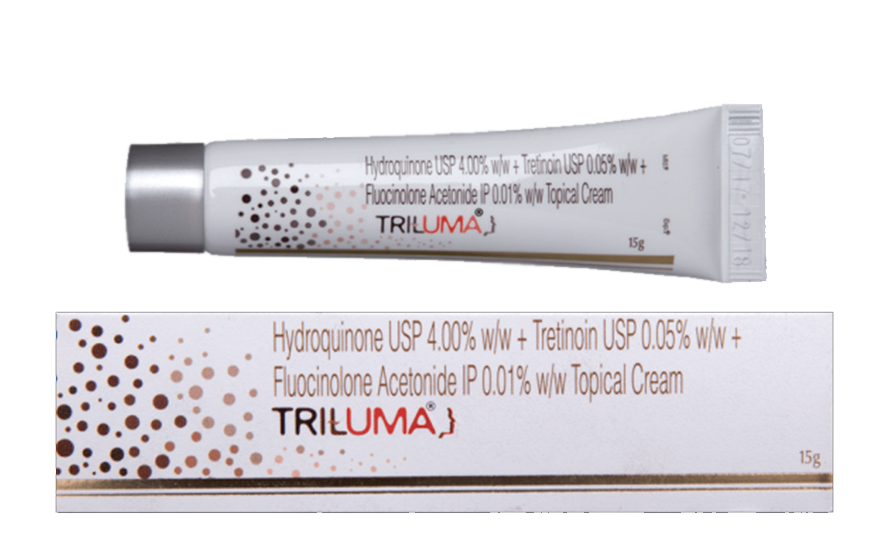Introduction
Triluma cream, a combination medication containing hydroquinone, tretinoin, and fluocinolone acetonide, is widely used for the treatment of hyperpigmentation disorders such as melasma and post-inflammatory hyperpigmentation. However, individuals with sensitive skin may be hesitant to use Triluma due to concerns about potential irritation and adverse reactions. In this article, we'll explore the safety of using Triluma cream on sensitive skin, considerations for sensitive skin types, and tips for minimizing irritation while maximizing the benefits of treatment.
Understanding Triluma Cream
Before we delve into its safety for sensitive skin, let's briefly understand Triluma cream and its components. Triluma cream combines three active ingredients:
- Hydroquinone: A skin-lightening agent that inhibits melanin production, thereby reducing hyperpigmentation.
- Tretinoin: A form of vitamin A that promotes cell turnover and helps fade hyperpigmented areas.
- Fluocinolone acetonide: A corticosteroid that reduces inflammation and prevents irritation caused by other active ingredients.
Together, these ingredients work synergistically to lighten dark spots and even out skin tone.
Safety of Triluma Cream on Sensitive Skin
1. Potential for Irritation
Triluma cream contains active ingredients that can cause irritation, especially in individuals with sensitive skin. Common side effects may include redness, dryness, itching, and peeling. However, sensitivity varies from person to person, and not everyone will experience these side effects.
2. Individual Tolerance
While Triluma cream may cause irritation in some individuals, others may tolerate it well, even with sensitive skin. Factors such as skin type, previous exposure to topical treatments, and underlying skin conditions can influence an individual's tolerance to Triluma cream.
3. Gradual Introduction
For individuals with sensitive skin, it's advisable to introduce Triluma cream gradually to allow the skin to acclimate to the active ingredients. Starting with a lower concentration or frequency of application and gradually increasing as tolerated can help minimize the risk of irritation.
Considerations for Sensitive Skin Types
1. Patch Testing
Before applying Triluma cream to larger areas of the skin, it's prudent to perform a patch test to assess skin sensitivity. Apply a small amount of the cream to a discreet area, such as the inner forearm, and monitor for any adverse reactions, such as redness or itching, over 24-48 hours.
2. Moisturize and Protect
Individuals with sensitive skin should prioritize moisturizing and sun protection while using Triluma cream. Applying a gentle, fragrance-free moisturizer to soothe and hydrate the skin can help minimize dryness and irritation. Additionally, daily use of a broad-spectrum sunscreen with SPF 30 or higher is essential to protect the skin from sun damage and prevent further hyperpigmentation.
3. Avoid Harsh Products
To prevent exacerbating sensitivity, individuals using Triluma cream should avoid harsh skincare products that can further irritate the skin. This includes products containing alcohol, fragrances, and abrasive exfoliants. Opt for gentle, non-comedogenic skincare products formulated for sensitive skin.
Tips for Minimizing Irritation
1. Use a Pea-Sized Amount
Apply a pea-sized amount of Triluma cream to the affected areas of the skin, avoiding contact with sensitive areas such as the eyes, mouth, and mucous membranes. Over-application can increase the risk of irritation without providing additional benefits.
2. Limit Frequency of Use
Initially, limit the frequency of Triluma cream application to once daily or every other day, gradually increasing to twice daily as tolerated. This allows the skin to adjust to the active ingredients and reduces the likelihood of irritation.
3. Skip Irritated Areas
If certain areas of the skin become excessively irritated or inflamed, temporarily discontinue Triluma cream in those areas until the irritation subsides. Resume treatment gradually once the skin has healed.
Conclusion
In conclusion, while Triluma cream can be an effective treatment for hyperpigmentation disorders, its use on sensitive skin requires careful consideration and monitoring for potential adverse reactions. By following a cautious approach, gradually introducing the cream, and prioritizing moisturizing and sun protection, individuals with sensitive skin can minimize irritation while maximizing the benefits of treatment.

